A Rust-free Winterized Woodshop
How to keep your tools from rusting during the cold winter months
I have a shed up north at my cottage in northern Ontario, and I will be housing a lot of my tools in there. In the winter, temperatures can get down to 0°F, or lower. Will temperatures like this damage components in power tools like circular saws, tablesaws, sanders, routers, etc.? I don’t really plan to use them at that temperature—it would freeze my fingers off—but for nine months of the year, it is really quite warm and I should be able to get a lot of work done outside the cold seasons.
-Brian Dingle
Hello Brian,
No worries about the cold hurting your tools, especially if they are dormant during the cold season. Your tools will sleep off the cold better than we will! Even if you were to use the tools, there would be little chance of damage from the cold. What will damage the tools is moisture, and during the change from winter’s icy grip to balmy spring weather there is a very good chance your tools will encounter damaging moisture.
There are some steps you can take to avoid that particular problem. As long as your storage area remains cold, moisture won’t accumulate on the tools or inside the motors or other internal workings. When the weather warms back up, if the cold tools are exposed to warm, moist air, the moisture will condense on and in the tools and could cause damage. If you can heat your shop, the easiest way to avoid corrosion is to heat the building, and the tools, to an indoor temperature above the outdoor temperature. Then the tools won’t be a point of condensation anymore and the potential problem is avoided. Also, it’s a good idea to keep the building closed up when those warm spring weather fronts move in; they’re typically loaded with moisture just waiting to transfer to your tools.
As long as we’re on the subject of tool damage in the form of corrosion, I have a few tips for folks who are trying to avoid the dreaded ferrous-oxide lament.
One method for keeping rust at bay is to cover the metallic surfaces with impermeable coverings. In my barn, where I can’t control the temperature, I cover my tools with poly sheeting draped over the iron and packing blankets or old sleeping bags covering the poly. The blankets provide a little insulation from the big temperature swings and the poly keeps moisture away from the metal; the dew point is on the outside of the poly, away from the iron. It’s not a convenient process but it’s a lot easier and quicker than trying to deal with rust.
If the tools are simply being stored and are not in use, a spray coat (not brushed) of lightweight motor oil does a great job of keeping rust at bay. But it renders the tools unusable. You’ll need to remove the oil from the tables or work surfaces before running boards over the them. An old spray-finish gun can make an effective device for spraying lightweight oil.
I wish I could name a magic cure for rust, but there is none. I know that rust is a huge problem in the Southeastern states, especially near the coast and in Florida where moist air is a way of life. Covering tools to provide a barrier from the moist air or keeping them in a climate-controlled atmosphere are probably the only ways to keep rust at bay. I guess the best defense against rust is to live in the desert!

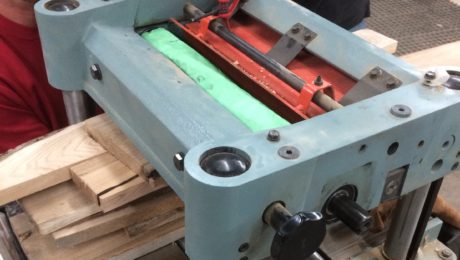
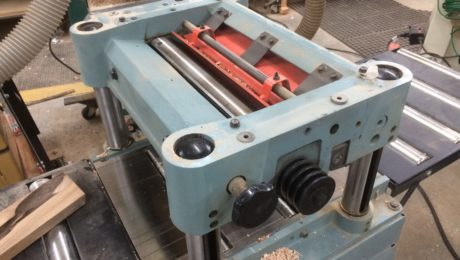
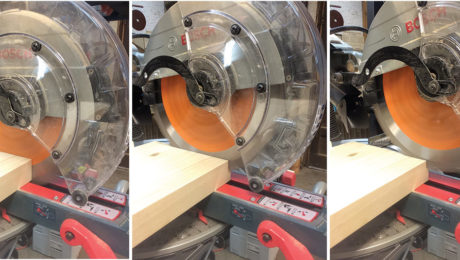
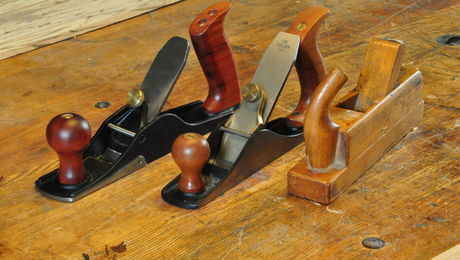


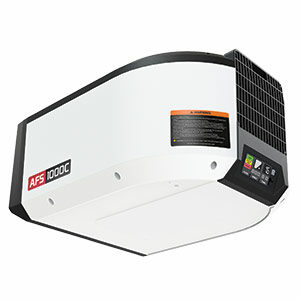
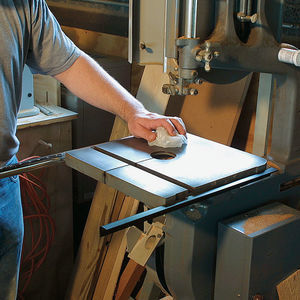
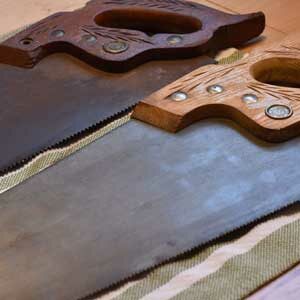
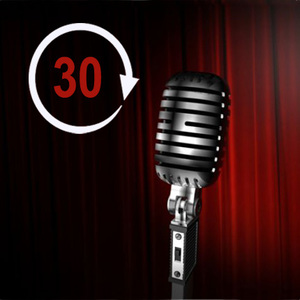












Comments
Re those Southeastern states, I live just South of Houston where we deal with very high humidity levels (80% - 95%) all year round. And to make things worse, my shop overhead door opens up to a pond just 60 feet away, that the neighborhood put a fountain in. A painter once commented that the South side of my house facing the pond/fountain, mildews worse than the North side. On windy days I can literally feel the mist hitting me while working in the shop. Couple tips that work for me:
1. Quality - I have no materials science to back this, but it seems my older and higher quality machines rust less readily than some of my newer and/or cheaper machines. I assume that's related to the quality of the cast iron. So I try to buy older used high quality machines.
2. Johnson paste wax. I've tried a number of rust "shields", but keep coming back to simple high quality paste wax. Goes on quick and easy, no nasty smells, and it helps the wood glide over the tables and fences. I even use it on the sides of my saw blades. As long as I keep a good coat applied, I have zero rust.
3. Machine Oil - for rods, shafts and other parts that would be hard to wax, I put some machine oil on a rag and wipe them down every few months.
4. Hand tools - I keep them in drawers but some (again seems to be the cheaper black metal ones) still rust. I've recently added a Zerust capsule in each drawer. It's supposed to emit a corrision inhibiting vapor barrier in each drawer for over a year, but I haven't them long enough to know if it's helping. They seem to have good ratings online.
That's my experience living on the sweaty Gulf coast!
I live in Minnesota where the Winters can be bitterly cold. For 20 years my workshop was in my garage shared with 2 cars. The cars of course were in use everyday so the overhead door was opened and closed several times a day to go to work, shopping, etc. Needless to say there were dramatic temperature swings throughout the year. The biggest problem I had was with the unpainted cast iron surfaces, table saw and jointer in particular.
To protect them I sprayed the surface with WD40 then while wet I covered the surface with wax paper. The WD40 would dissolve some the wax and the paper would adhere to the surface. In the Spring with warm enough weather to work in my garage I would remove the wax paper, it came off easily. I would then spray on more WD40 to dissolve and remove the leftover wax left by the paper. This process worked well for me.
In the Scottish Borders, we get a fair amount of moisture in the air over the 6-month winter: 80 to 98% is very common with normal temperatures ranging 10 to 55 F. I've used the shop under these conditions as well as through the (slightly!) warmer and generally drier summer over 35 years and don't have a problem with rust. Here's a few things I've found to be important.
1. Tools rarely rust when they are used regularly and just wiped at the end of the day with a rag laced with light machine oil.
2. Take care with oils because they generally contain nasties that can be absorbed through the skin and can damage hearing for example. So wear gloves when you are using oils or that rag at the end of the day. I've used camelia oil too, but only for tools in everyday use since it can form a gum when left too long without wiping. Generally, I prefer machine oil.
3. Fingerprints corrode metal, so when you are putting tools away hold the metal with the oily rag as you slip the plane into its sack etc. (you'll be wearing gloves anyway...).
4. To store tools, keep the critical surfaces in contact with oil. I use irrigation mat (from garden stores) that I lace with oil for this. For those chisels that I don't have in oiled tool rolls, I lay oiled mat over them in drawers, keeping the edges folded in small bits of mat. I store planes in oiled plane sacks stood on oiled mat. I spray cast iron tables with WD40 every couple of months and lay oiled mat on top. I just wipe my saws with an oily rag after use and sometimes run a bead of oil down the teeth. I've a rag that I use just to wipe excess oil off tools before use.
5. Keep a space and a moisture barrier between tool shelves/drawers and cold massive surfaces (exterior walls) on which atmospheric moisture, including breath, will condense.
6. Every couple of months, check your less frequently used tools to avoid problems arising from the odd unexpected contamination with moisture.
If all this sounds laborious it's not - just adapt to a sensible level and get on with enjoying what you do. Maybe this will be useful in the US and Canada, but I do realise that in some parts conditions are much more extreme.
To clean rusty tools, you can mix 1 part molasses to 10 parts water. Let the item soak for a couple weeks, then clean it with a wire brush and some running water. It works great. You can also put some paste wax on the item to help keep from rusting or at least rusting as quick. Good luck.
Firstly batteries will suffer in the extreme cold and given the expense I'd never leave them in cold workshop.
As for rust? Well if you exclude the air you solve the problem. And the cheapest way of doing that if you are going to store things for a long time is to use the cheap vacuum bags used for squashing down duvets and clothes. Buy a bunch of them and simply vacuum pack your gear until you need them. A bit of oil first will help stop any acid from your fingers from marking bare steel when you handle them.
Rolland,
I have had good success with VCI (Vapor phase Corrosion Inhibitors) emitters. I have them in all my tool boxes both in my shop and unheated garage. It may seem like smoke and mirrors, but the technology really works. I also use VCI impregnated papers to wrap tools for long term storage. Cortec (cortecvci.com) makes a full line of products, but their bulk packaging is better suited to industrial users. Bull-Frog.com repackages and private labels Cortec in more rational quantities. In addition, I regularly use CRC 3-36 on all surfaces. For example after I de-pitch and wash blades and bits. See Tom McKenna's informative article in July/August 2012 FWW.
[Full disclosure, I was a founder of Northern Instruments where I commercialized volatile phase corrosion suppression technology later acquired by Cortec.]
Log in or create an account to post a comment.
Sign up Log in